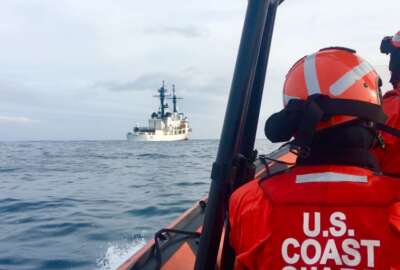DHS to offer ‘lifeboat’ reassignments to employees in expiring CWMD office
DHS wants to make sure employees at the Counter Weapons Office of Mass Destruction stay feds, even if Congress lets the office's authority terminate.
The Department of Homeland Security is setting up potential reassignments for employees in its Countering Weapons of Mass Destruction unit if Congress fails to reauthorize the office later this year.
The authority for the CWMD office terminates Dec. 21. While bipartisan legislation to reauthorize CWMD exists in both chambers of Congress, time is running short as lawmakers face another looming government shutdown scenario in mid-November, while House Republicans have yet to appoint a new speaker.
“It’s a complicated congressional environment right now,” Mary Ellen Callahan, the assistance secretary of DHS’s CWMD Office, said in an interview.
The CWMD office is responsible for working with state and local governments as well as international partners to guard against chemical, biological, radiological and nuclear threats to the United States.
“We’re explaining the value proposition that is the CWMD office,” Callahan said regarding DHS’s conversations on Capitol Hill. “How integrated we are with our DHS components, how we support our components, providing them equipment, training, technical assistance, and expertise. And how we also are working with our state and local stakeholders that comprise almost 40% of the U.S. population.”
With the CWMD office facing termination, however, DHS leaders are considering contingency reassignments for the 234 employees who work there. Callahan said DHS leaders have agreed to keep open some jobs in the coming months to prioritize the reassignment of CWMD employees should Congress fail to act.
CWMD employees have until Nov. 17 to select a reassignment offer. They would then be officially reassigned to those new positions on Dec. 17, which is the start of the first pay period before CWMD’s authority expires.
After Dec. 17, Callahan said CWMD would not be able to pull them back if Congress makes a last-ditch reauthorization attempt. She said it would be the “largest management directed reassignment” in DHS’s history.
“The contingent reassignment is to give a lifeboat to folks, to make sure that they continue as a fed, they don’t have a break in service, and that they can find a job that is at least within their series and grade,” Callahan said.
The office includes employees ranging from nuclear physicists and chemical engineers to veterinarians who work on bio-surveillance programs.
“These are unusual positions that we’re really leaning forward to make sure we can find a place where they can be productive federal employees, if indeed CWMD goes away,” Callahan said.
But she said the office is starting to see some “slight attrition” due to the uncertainty about the office’s future.
“We’ve had a couple of people who have left and I know other people are looking at it, or considering retirement or other exit options,” Callahan said. “I have encouraged them to stay around, because I feel very passionate about this mission. And I feel that it’s an incredibly important time for this office to continue. With that said, I understand that people have to make choices on their own. I think the closer we get to December, particularly the latter part of the month, the more we’re going to see people exiting the office at their own will.”
The CWMD office was formally established in 2018 and has struggled with morale challenges for much of its existence. Its employee engagement score of 39.4 in 2022 ranked 430th out of 432 subcomponents across the entire federal government.
The office has struggled with turnover among its senior leadership ranks, according to the Government Accountability Office. Callahan is now the fourth different assistant secretary to take the helm since 2018.
Callahan was previously chief of staff to former DHS Deputy Secretary John Tien, who led a DHS-wide morale improvement initiative.
“I’m taking what I learned and applying it here at CWMD,” she said. “I am an engaged leader that likes to inspire teams to get the best out of them, and also have individuals feel seen and heard. And I’m leading the office this way. I’m trying to be very candid about where we are. But I’m also trying to inspire the team to let them know that not only do I believe in them, but I think I can get more out of them.”
If the office is reauthorized, she said her longer term goal is to make CWMD’s operations more integrated into the processes and policymaking happening across other DHS components.
“We can help be subject matter experts for them, as we face this weapons of mass destruction issue,” Callahan said. “And that’s, I think, how to help the morale here. These people are experts, and they want to be seen as an expert, and they want to be engaged in the mission.”
Copyright © 2024 Federal News Network. All rights reserved. This website is not intended for users located within the European Economic Area.
Follow @jdoubledayWFED






